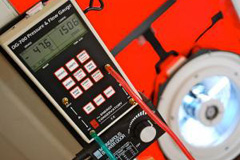Home Energy Assessment and Diagnostic Testing FAQs
What is it?
A comprehensive home performance assessment is a road map to improved home comfort, significant energy savings, and a healthy indoor environment.
How much does it cost?
A quality home energy assessment by a certified building analyst will cost between $350 and $600. This is money well spent if you are considering a comprehensive home performance upgrade, which typically costs between $2500 and $10,000.
Who is certified to do home energy testing?
The comprehensive home performance assessment can be done by an independent BPI or RESNET certified professional. This certification means they understand building science concepts and can apply this knowledge to deliver high performance home improvements that work better and save money.
Does the Building Analyst sell home improvements?
Some building analysts specialize in doing only the analysis to avoid potential bias on improvement recommendations. Most building analysts are certified home performance contractors who assess and install home performance improvements. A home performance contractor offers a package of measures that work together to maximize efficiency and comfort.
How do I get multiple bids on a job?
If you want to shop around between contractors, have the energy assessment done by an independent building analyst professional. A typical independent building analyst report is an in-depth, multi-page evaluation with photos identifying trouble spots and recommended improvements prioritized by simple payback. The independent analysis is usually the most expensive choice, but it offers the assurance that the recommendations are not biased toward the contractor specialty.
I know what I need, where do I start?
If you have already selected a AlabamaWISE contractor for your home improvement, their in-house building analyst will do a comprehensive assessment as part of the work-scope to evaluate the impact of proposed measures. The assessment will typically reflect the contractor specialty: 1) insulation/air sealing/ duct sealing, 2) heating/cooling, 3) windows. AlabamaWISE can help direct you to the right contractor specialty based on your specific need or problem and participating home performance contractors are required to make home improvement recommendations based on a comprehensive assessment with diagnostic testing. The assessment benchmarks the home’s current functional condition by documenting the home’s insulation, windows, walls, attic and crawl space or basement, heating, cooling, hot water heater, bath fans and duct system. The building analyst will test the home for air leaks using a blower door and may use a thermal camera to identify the location of air leaks for developing the work plan. If there are gas appliances or furnace, the analyst will test for unsafe levels of carbon monoxide. The analyst may also test the duct system for leaks using a duct-blaster if duct sealing is part of the proposed work scope. Some homes have more than one heating/cooling/duct system. The building analyst will interview the home’s occupants about comfort and health issues – Are some rooms too hot or cold? Are utility bills too high? Is there a mold or other indoor environmental concern? The final home performance assessment will include a proposed work scope, projected energy savings, simple payback analysis, and EPS label.
What about free energy audits?
Try the free online audit from TVA at this link. Beware free energy audits from contractors because they are a sales tool and may not properly identify which home improvements will be most cost effective. The EPS scorecard is a clipboard audit or walk-through audit, these quick evaluations benchmark insulation levels and heating/cooling efficiency. This can be a helpful guide to deciding whether a more comprehensive assessment is worth the price, but diagnostic testing with blower door and energy modeling is essential to making an informed choice about the most effective improvements, especially if you need to fix a problem other than high utility bills.


Comments are closed.